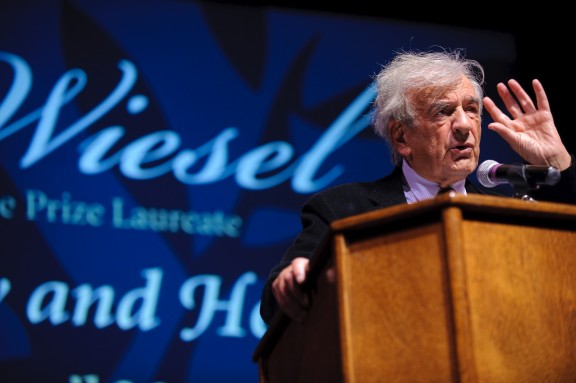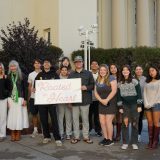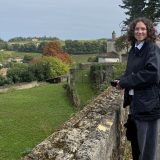
Elie Wiesel visit to be highlighted by conversations with students, faculty
March 27, 2012
Elie Wiesel – winner of the Nobel Peace Prize, bestselling author, Holocaust survivor, and global leader in human rights advocacy – will return to Chapman University on April 15-22. His annual one-week visit marks the second year of his five-year appointment as a Distinguished Presidential Fellow at the university. While on campus, Wiesel will meet with students and faculty and be a guest speaker in various classes.
This year, Wiesel plans to present four “Conversations” during his visit. The moderated discussions (which will be open only to the university community, not to the general public) will focus on themes central to his work and to the university community. Scheduled topics include:
- “Why Study?” (moderated by Daniele Struppa, Ph.D., Chapman University chancellor)
- “Why Write?” (moderated by English professor Patrick Fuery, Ph.D.)
- “Why Be Just?” (moderated by Tom Campbell, dean of Chapman University School of Law)
- “Why Believe?” (moderated by Gail Stearns, Ph.D., dean of the Chapman University chapel)
Chapman University President James L. Doti, Ph.D., sees this as another exceptional learning experience for the Chapman community. “Elie Wiesel challenges us to ask ourselves the big questions,” Dr. Doti said. “He believes that as human beings, we are defined more by the questions we ask than by the answers we give. I am especially excited that our students will be able to join with Professor Wiesel in a week of questions and conversations. I know this week will have an impact on their years here at Chapman and on the way they look at the world.”
Elie Wiesel first visited Chapman University in April 2005, when he took part in dedication ceremonies for the university’s Sala and Aron Samueli Holocaust Memorial Library. His second visit came in April 2010, when he spoke to the university community and was guest of honor at a gala marking the 10th anniversary of the Rodgers Center for Holocaust Education and the Stern Chair in Holocaust Education. That same year, he accepted a five-year appointment as a Distinguished Presidential Fellow at Chapman University. In that role, Wiesel is invited to visit Chapman annually to meet with students and offer his perspective on subjects ranging from Holocaust history to religion, languages, literature, law and music.
Wiesel received the Nobel Peace Prize in 1986 for his work as a “messenger to mankind” of “peace, atonement and human dignity.” He is the author of more than 50 books, including Night, a work based on his experiences in the Auschwitz, Buna and Buchenwald concentration camps. He remains a faculty member at Boston University, where he teaches and lectures.

